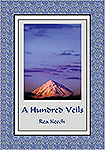Review: A HUNDRED VEILS by Rea Keach (Iran)
A Hundred Veils
Rea Keech (Iran 1967–69)
Real Nice Books
2015
310 pages
$9.99 (paperback), $27.99 (hardcover), $2.00 (Kindle)
Reviewed by Darcy Munson Meijer (Gabon 1982–84)
•
Rea Keech has written a novel that informs, inspires and delights. A Hundred Veils is a love story that takes place in 1968 Iran. The protagonist is Marco, a young American teaching English at the University of Tehran for the International Teachers Association. As Keech served with the Peace Corps in Iran at the same time, his novel necessarily draws much of its verisimilitude from his experiences there.
Of all the books Peace Corps Worldwide’s editor offered me to review, I immediately chose this book. My family and I have just left the United Arab Emirates after 7 years of contented living, and I am eager to read anything about the Middle East. I miss the Emiratis’ generosity, their keen sense of humor and Bedouin sensibility, even the pageant of religious history still played out every day. However, like many Americans, I knew of Iran only through popular U.S. media and a smattering of geography lessons. I learned quite a bit from the novel.
In A Hundred Veils Keech describes what living in Tehran was like in the late 1960s, when public opinion regarding religion, gender issues, education and government was pulled in many directions. When I asked him about the political environment at the time, he put it this way:
There was a lot of resentment of the Shah for the reasons you mention [the Pahlavis had too much money, and the regime was kowtowing to the West], but all the resistance was underground, not very obvious or organized. There were still nationalists who resented the CIA-sponsored coup that overthrew Prime Minister Mossadeq and put the Shah in power. There were also lots of people who supported the Shah.
He added that it would have been difficult then to imagine that the Shah would be deposed in 1979.
One of the most charming aspects of A Hundred Veils is Keech’s inclusion of Persian poetry. He cites lines from classical poets Hafez, Rumi, and Attar at the start of each chapter, and other lines are spoken in loving murmurs and notes throughout the story. Keech says the main female character “hearkens back to the Sufi idea that the relationship between lover and beloved on earth reflects the love of god, and that this kind of relationship is on a higher, holier level than literal adherence to any religious precepts.” This notion supports her when the love she feels for Marco conflicts with her culture’s expectations.
Here is one beautiful passage:
Oh Lord, whose house is this
That lights a candle in my heart?
Ask who this charmer is who set my soul on fire.
And another:
Lovers, oh lovers, the time to migrate from the world has come.
The drum of heaven is sounding the departure in your soul.
Keech has written several other books, as yet unpublished, and his experience shows. The plot of A Hundred Veils moves along evenly, and he rapidly changes from scene to scene (more than 70) with the various interpersonal dramas he has set up. There is no waste in the novel. His characters are rounded, and all inform the plot and sub-themes. In fact, I had become so involved with the characters that I asked Keech if he could tell me what happens after the story’s last page. Sadly, he’s not telling.
•
Reviewer Darcy Munson Meijer served with the Peace Corps as a TEFL in Gabon, Africa. She has written over 15 book reviews for Peace Corps Worldwide, learning about the world and the art of writing in the process. She teaches at New Mexico State University in Las Cruces, where she lives with her husband and sons.
No comments yet.
Add your comment